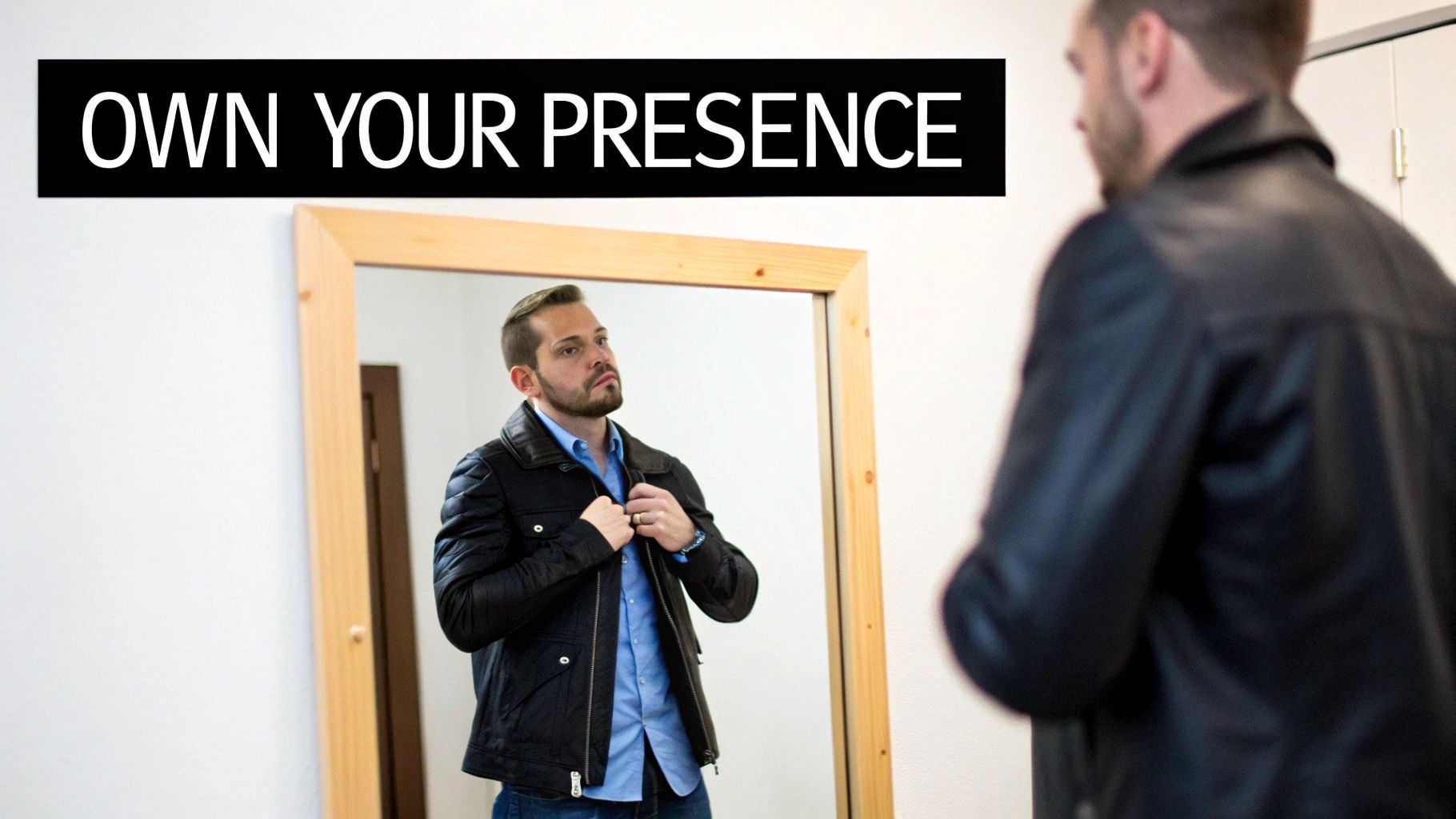Jan Elvis
08.11.2025

Jan Elvis
08.11.2025
Real confidence isn't about faking it 'til you make it. It's about mastering your inner world—your thoughts and beliefs—while taking deliberate, consistent action in the outer world. It’s a skill, and like any skill, it's built by rewiring your mindset, proving your competence to yourself, and owning how you show up every day.

Let’s get one thing straight: the idea that men are naturally born with unshakeable confidence is a myth. The truth is, most of us battle self-doubt, social anxiety, or that nagging feeling of not being good enough on a regular basis. This isn’t weakness. It’s a completely normal part of being human, but it’s dialed up to eleven by modern life.
Between societal pressure, career hurdles, and the toxic comparison game on social media, it's easy to feel like you’re constantly falling behind. You're bombarded with curated highlight reels, making it feel like you're the only one who hasn't figured it all out.
Sometimes, the root cause is even physiological. Hormonal imbalances can tank your mood and energy, so looking into natural ways to boost testosterone can be a game-changer for your overall self-assurance.
The numbers back up what so many men are feeling. A 2021-2022 UK study found that only 42% of men felt confident in their professional skills. Worse yet, a shocking 19% considered themselves attractive. That’s a huge gap between who men are and who they think they are.
This isn't just about feeling bad. A lack of confidence actively holds you back. It stops you from:
The journey to building confidence isn't about becoming a different person. It's about removing the internal barriers that prevent you from being your most authentic and capable self.
So, how do you actually build confidence that sticks? Forget the generic, feel-good advice. This guide is your practical, no-fluff roadmap. We're going to focus on a structured approach that works, built on three essential pillars.
This table breaks down the core of what we'll be covering.
| Pillar | Focus Area | Key Outcome |
|---|---|---|
| Mindset | Rewiring your internal thoughts and beliefs. | Develop resilience and a positive self-image. |
| Action | Building skills and taking consistent steps. | Gain genuine competence and self-assurance. |
| Presence | Controlling your body language and appearance. | Project self-respect and influence perceptions. |
By working on these three areas, you'll build confidence that's real. It won’t be a fragile mask but something solid, grounded in genuine competence, resilient self-talk, and a powerful physical presence. This is your blueprint for becoming the main character in your own life.

Any real journey toward building confidence starts with the conversation you're having with yourself. Before you can walk into a room and own it, you need to deal with that voice in your head—your inner critic. You know the one. It’s the one that constantly points out your mistakes and conveniently forgets your strengths.
This isn’t about fluffy, feel-good mantras. It’s about getting your hands dirty and using some practical mental tools to actually change the script.
The first thing to get is that your thoughts aren't facts. Seriously. They're just automatic reflexes your brain has developed over years, shaped by everything from a bad experience in school to social media pressure. That thought, "I'm going to totally bomb this presentation," isn't a prophecy. It's a bad habit. The game is to catch that habit in the act and challenge it head-on.
One of the most powerful ways to do this is with something called cognitive reframing. It sounds a bit clinical, but it's simple: you learn to consciously shift your perspective on a situation. Instead of letting a negative thought run the show, you stop, question it, and swap it for something that actually helps you.
Let's make this real. Here’s what it looks like in action:
That thought: "I'll never be as successful as that guy on Instagram. He's got it all figured out."
The reframe: "I'm looking at his highlight reel, not his behind-the-scenes struggles. I'm going to focus on my next step, like crushing that workout I have planned."
That thought: "If I take on this new project, I'll probably fail."
The reframe: "Okay, what's the very first small thing I can do to get the ball rolling and make success more likely?"
See the difference? You go from being a passenger in your own anxiety-mobile to grabbing the steering wheel. It's not about pretending you'll never fail. It's about putting your focus on what you can actually control. That’s where true confidence is forged.
Imposter syndrome is a liar, and it gets away with it because it makes you forget your own history of success. That little voice conveniently erases all your past wins and plays your one big screw-up on a loop. To fight back, you need to build a solid case for your own competence. Think of it as creating an "evidence log."
Your brain is naturally wired to remember threats and failures more than successes—it's an old-school survival thing. You have to consciously train it to see the good stuff by writing it down.
Pull up the notes app on your phone or grab a cheap notebook. Every single day, write down one thing you did well. It doesn't have to be monumental.
For example, your log might look like this:
The next time self-doubt starts whispering in your ear, you open this log. This isn't about "feeling" confident; it's about looking at the cold, hard facts of what you've accomplished. This simple habit starts to physically rewire your brain to recognize your own value, building a foundation for confidence that can't be easily shaken.
https://www.youtube.com/embed/8IhFPJ6Pysc
Mindset is the engine, but action is the fuel that makes it go. Thinking positively is a great start, but true, unshakeable confidence is earned through competence. It’s that deep-down self-assurance you get from knowing you can handle things because you’ve put in the reps.
You can't just fake this kind of confidence. It has to be built on a solid foundation of real skills and actual accomplishments. Every time you master something new—whether it’s nailing a new lift at the gym, crushing a presentation at work, or even just learning how to change a flat tire—you give yourself concrete proof of what you're capable of.
This creates a powerful feedback loop: The more you do, the more you genuinely believe you can do.
The trick is to start small. Forget trying to become a master overnight. Instead, focus on setting and hitting tiny, manageable goals that nudge you just a little bit outside your comfort zone. This is how you build momentum without getting overwhelmed.
Let’s get practical with it:
Each of these small victories adds another brick to the foundation of your confidence. It's a slow and steady process, but it works because you're proving to yourself, step by step, that you are capable of growth.
Confidence isn't some magical personality trait you're born with. It's the direct result of taking action, collecting evidence of your own competence, and expanding what you're comfortable with—one small step at a time.
This action-first approach pays off big time, especially in your career. While competence is obviously crucial, it’s the confidence that comes with it that often gets you noticed and moves you forward. The research backs this up, showing that a man's self-assurance can play a huge role in his career progression.
For example, a study from the Centre for Longitudinal Studies found that men are 34% more likely than women to land top jobs by age 42. Interestingly, overconfidence was found to explain up to 11% of that gap. Why? Because a stronger self-assessment often leads men to put their hand up for promotions and take risks. As you build real-world skills, your self-belief naturally grows, making you far more likely to seize those same opportunities.
Ready to stop thinking and start doing? Pick one area you want to get better at and commit to one small, actionable step. Don't just ponder it—write it down, put it in your calendar, and make it happen.
| Skill Area | Your First Small Step | The Goal |
|---|---|---|
| Physical Fitness | Do 10 push-ups every morning for one week. | Build consistency and physical discipline. |
| Financial Literacy | Read one solid article about investing basics. | Gain knowledge and reduce money-related anxiety. |
| Communication | In your next conversation, practice active listening. | Improve your connections and social poise. |
This isn't just about learning new stuff; it’s about fundamentally changing how you see yourself. Every skill you pick up is another piece of evidence that you can learn, adapt, and overcome whatever comes your way. To go deeper, you can explore these proven strategies to build self-confidence.

How you show up in the world is a direct reflection of how you feel on the inside. But it’s a two-way street. Nailing your physical presence isn't about being vain; it’s about signaling to yourself and everyone else that you have self-respect. This kicks off a powerful feedback loop: when you look confident, you start to feel more confident.
The way you carry yourself says more than words ever could. Think of confident body language as a skill you can learn and practice. Start with your posture. Right now, imagine a string gently pulling the top of your head toward the ceiling. Feel your spine straighten and let your shoulders roll back and down. That simple tweak instantly makes you appear more engaged and sure of yourself.
Next time you walk into a room, keep your head up. Look forward, not down at your phone or the floor. Make brief but real eye contact with people you pass. It’s a small gesture, but it communicates that you’re present, aware, and comfortable in your own skin.
There’s a real psychological concept called "enclothed cognition," and it’s fascinating. The basic idea is that the clothes you wear can literally change how you think and perform. When you put on an outfit that makes you feel sharp and capable, you start to act that way. It’s like wearing the uniform for the man you want to be.
This isn’t about dropping a ton of cash on designer labels. It’s all about fit. A t-shirt and jeans that fit you perfectly will always look a hundred times better than a sloppy, oversized suit. The details make all the difference.
Dressing well is a form of self-respect. When you take the time to present your best self, you're sending a message to your own brain that you are someone worth investing in.
A solid grooming routine is probably the easiest win for boosting your confidence every single day. The goal is to create a simple, repeatable system that ensures you always look and feel clean, sharp, and ready for anything. You don’t need a medicine cabinet overflowing with products to see a major impact.
Here are a few non-negotiable habits to lock in:
These external habits—from your posture to your daily shave—aren’t superficial. They are concrete actions that lay a foundation of self-respect. To get a more detailed playbook, check out these essential grooming tips for men and get your routine started.

Real confidence isn't just a feeling you have on the inside; it’s how you show up and interact with others. Walking into a party or a big meeting can feel like a high-stakes game, but having a solid playbook makes all the difference. This is where all that inner work you’ve been doing finally gets put to the test.
The goal isn't to magically transform into a smooth-talking extrovert overnight. It’s about understanding the mechanics of genuine connection while setting clear boundaries. That's what gives you a sense of control and competence in any room you walk into.
It's interesting, though. While a lot of guys feel this pressure, some studies show a different story on the surface. A huge study from the American Psychological Association, covering 48 countries, found that men consistently reported higher self-esteem than women at every age. You can dive into the findings on self-esteem gender differences if you're curious.
Let's be honest, starting a conversation is often the hardest part. The trick is to stop worrying about yourself and get genuinely curious about the other person.
Your best friend here? Simple, open-ended questions. They can’t be answered with a "yes" or "no," which naturally gets the conversation flowing.
The most charismatic people are usually the best listeners, not the best talkers. When you make someone feel heard, you build an instant connection, and your own confidence gets a massive boost.
Shifting your focus to them takes all the pressure off you to "perform."
At work, you need to project competence. But there’s a razor-thin line between coming across as confident and tipping over into arrogance. The truly confident guy lets his actions and the quality of his work do the talking.
Here’s how you strike that perfect balance:
Dealing with the inner monologue of social pressure is a real challenge. If you want more specific strategies, our guide on how to overcome social anxiety lays out practical steps you can start using today.
When you arm yourself with these social tools, you’ll find you can handle anything—from a first date to a boardroom presentation—with a lot more ease and self-assurance.
As you start putting these ideas into practice, you're bound to run into a few questions. Building confidence isn't always a straight shot to the top; think of it more like a climb with a few switchbacks. Having some clear answers to common roadblocks can make the journey a whole lot smoother.
Let's dig into some of the big ones.
This is usually the first question guys ask, and the real answer is that confidence is a practice, not a destination. You'll definitely notice a shift in your mindset and how you carry yourself within a few weeks of consistent effort. But deep, unshakable confidence? That's built over months and years.
Think of it like getting in shape. You feel better after just one week of cleaning up your diet and hitting the gym, but developing real, lasting strength is a long-term project.
The point isn't to cross some imaginary finish line called "I'm confident." It's to build a set of daily habits and a resilient way of thinking that just becomes part of who you are. Focus on the process, and the results will follow.
This is a huge one. It's crucial to get this right because, from the outside, the line can sometimes look a little blurry. Internally, though, they're worlds apart.
Here’s a simple way to think about it:
Confident men are genuinely interested in listening and learning from others. Arrogant men are more focused on talking, dominating the conversation, and proving they're the smartest person in the room. True confidence comes from competence and self-respect, not from needing everyone else to think you're great.
Look, everyone gets knocked down. A project at work bombs, you face a tough rejection, or you just have a really awkward social moment. It happens. The game isn't about avoiding these things—it's about how you get back up.
When you take a big hit, the very first thing to do is give yourself a break. Acknowledge that it sucks and it's okay to feel bad about it. Don't start beating yourself up.
Next, try to see the failure as a piece of data, not a final verdict on you as a person. What did you learn? Pull out that "evidence log" of your past wins that we talked about earlier. Remind yourself that one screw-up doesn't cancel out all your previous successes. Then, just take one small, simple step to get back in the game.
At Main Character, we're firm believers that feeling good on the outside is a massive step toward building confidence on the inside. Our premium grooming products are crafted to be a core part of your daily routine, helping you look and feel your absolute best. Explore our collection and start investing in yourself today.